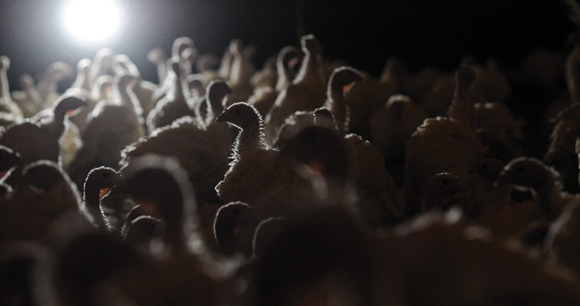Grim Fate for Factory-Farmed Turkeys
Since the early 1800s, at least, turkey has been a traditional part of holiday dinners in America. Approximately 50 million turkeys are killed for Thanksgiving each year, with another 22 million killed for Christmas dinner. But most Americans know little about the life of the animal who provides the centerpiece for their holiday table.

Most turkeys found on supermarket shelves in the United States were raised among thousands of others in industrial facilities without access to fresh air or the outdoors—a life that no living being would be thankful for. Turkeys who may reach 20 pounds or more are packed tightly together with only a few feet of space each. To prevent feather pecking, cannibalism, and other aggressive behaviors due to crowding and stress, producers perform painful mutilations, such as cutting off the ends of birds’ beaks and toes. Lighting in the buildings is also kept dim to minimize aggression and encourage weight gain.
In addition to being exposed to poor environmental conditions, many turkeys suffer from a host of health and welfare problems that result from selective breeding for rapid growth and high meat yield. Modern turkeys grow so quickly their bodies cannot keep up, and they suffer from skeletal problems and leg abnormalities. Turkeys have even become too large to mate naturally, leaving artificial insemination as the only option for breeding. Their myriad health issues lead to high mortality rates on the farm, long before the birds ever reach the slaughterhouse.
Fortunately, for those looking for an alternative to conventionally raised turkeys, there are now more options than ever. While the vast majority of turkeys are still raised in conventional systems, specialty products from higher-welfare farms are steadily increasing. But buyers should beware. A slew of misleading turkey labels make it difficult for consumers to properly evaluate animal welfare and environmental claims. “USDA Certified Organic,” for instance, does not guarantee higher welfare. Even “free range” can mean far less than it implies—in some cases, so-called free range turkeys are given only a few square feet of gravel or barren dirt.
One way for consumers to ensure that turkey and other meat products align with their preferences for animal treatment is to look for verification by independent auditing programs—a “seal of approval” from a trustworthy source. However, even among third-party food certifications, animal welfare standards can vary greatly. Some programs have high standards, whereas others reflect only marginal improvement over conventional industry practices.
While it is possible to find turkey products that come from birds who experience a life worth living, some research is required to navigate the maze of competing brands and confusing, sometimes deceptive labels. AWI can help. We offer a free comprehensive guide to label claims commonly found on meat, egg, and dairy products. (See page 8 for more information.) And, of course, one can also simply leave turkey off the plate. A growing number of Americans are celebrating the season with cruelty-free, plant-based protein options.
Program Terms: Farmed Animals
AWI Quarterly Terms: Feature Article
Related News
Titus Reintroduces Humane Transport of Farmed Animals Act as New AWI Report Reveals Feeble Enforcement of Welfare Violations
In Program: Farmed AnimalsToday, US Rep. Dina Titus (D-NV) reintroduced the Humane Transport of Farmed Animals Act to improve conditions for livestock transported across the United States. The bill would...
New Poll: Consumers Overwhelmingly Support Meaningful Standards for “Humanely Raised” Food Label
In Program: Farmed AnimalsEighty-eight percent of American consumers believe that claims such as “humanely raised” or “sustainably farmed” on meat and poultry products should be based on meaningful,...
New Research: USDA Fails to Pursue Prosecutions of Slaughter Plants, Despite Repeat Violations
In Program: Farmed AnimalsRepeat violators of the federal Humane Methods of Slaughter Act (HMSA) continue to escape meaningful enforcement by the US Department of Agriculture, resulting in continued...
AWI Scholarship Winners Campaign for a Better World for Animals
In Program: Animals in Laboratories, Farmed AnimalsThe Animal Welfare Institute (AWI) announced today the 12 winners of a scholarship designed to invest in future leaders who seek to improve the lives...